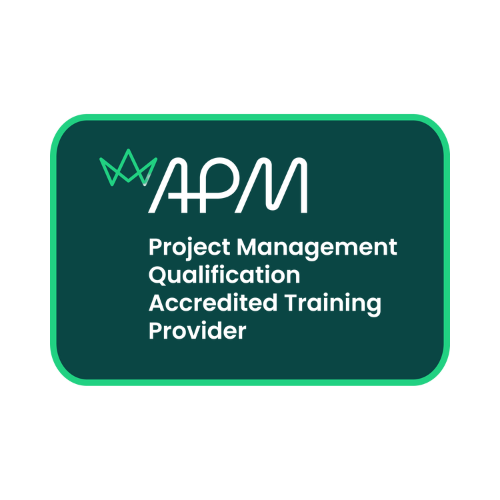APM Project Management Qualification (PMQ)
The Project Management Qualification (PMQ) will give you the knowledge to demonstrate all aspects of project management. The PMQ will also provide a full understanding of how this knowledge will allow you to work strategically within your business.
Who Should Consider This Level?

Available Study Methods
Found the same course quality at a lower price elsewhere? We'll match it!
We are confident in our ability to deliver an exceptional learning experience. If, prior to enrolment, you can find the same course material, delivery method and tutor experience for a lower price, then we guarantee to match that price. Click here to view our prices.
Download our brochures for information and pricing

Learning Outcomes
The PMQ syllabus encompasses 11 learning outcomes and 47 assessment criteria, providing a comprehensive scope of your learning.
Click here to explore the syllabus in detail.
Understand how organisations and projects are structured
Students will learn about key aspects of project management, including organisational breakdown structures for responsibility assignment matrices, project manager roles, distinctions between project manager and sponsor responsibilities, various project management roles, different types of project offices, and the need for project management governance elements like policies and regulations.
Understand project life cycles
Students will explore the rationale behind structuring projects into phases within a linear life cycle, discern the differences between a project life cycle and an extended life cycle, outline the importance of knowledge and information management in decision-making processes, explain the advantages of conducting reviews throughout the project life cycle, such as decision gates, benefits reviews, and audits, and understand the reasons why projects may close prematurely.
Understand the situational context of projects
Students will differentiate between project management, portfolio management, and program management, outlining their respective roles and distinctions. They will also understand the relationship between programs, projects, and strategic change, identifying situations where programme management and portfolio management are appropriate.
Understand communication within project management
Students will comprehend the relationship between stakeholder analysis and effective communication management plans, recognising factors that can influence communication positively or negatively. They will identify common sources of conflict within projects and understand strategies for conflict resolution, including the application of tools such as the Thomas Kilmann Conflict Mode Instrument.
Understand the principles of leadership and teamwork
Leadership profoundly influences team performance and motivation, drawing from models such as Maslow, Herzberg, and McGregor. Effective leadership fosters engagement and influence, vital for leading teams, including virtual ones, through development stages.
Understand planning for success
Understand the pivotal role of a business case throughout the project life cycle, anchoring investment decisions and governance. Grasp the concept of benefits management, encompassing identification, definition, planning, tracking, and realisation to ensure project objectives are achieved.
Understand project scope management
Students will have gained an understanding of how to establish scope through requirements management processes, including gathering, analysing, justifying requirements, and defining baseline needs. They will also comprehend how to manage scope through configuration management processes, covering planning, identification, control, status accounting, and verification audits.
Understand schedule and resource optimisation
Students will learn to distinguish between critical path and critical chain as scheduling techniques, understanding how each method impacts project timelines. They will explore how resources are categorised and allocated within both linear and iterative life cycle schedules, recognising the nuances of resource management in different project contexts.
Understand project procurement
Students will understand the distinctions among various methods of supplier reimbursement, such as fixed price, cost plus fee, per unit quantity, and target cost, discerning the implications of each on project finances and risk allocation. They will also differentiate between different contractual relationships, including their respective advantages and limitations in ensuring project success and managing supplier relationships effectively.
Understand risk and issue management in the context of project management
Students will grasp the concepts of proactive and reactive responses to risk, encompassing strategies like avoidance, reduction, transfer, acceptance, exploitation, enhancement, sharing, and rejection, understanding how each approach mitigates or addresses potential risks in project management.
Understand quality in the context of a project
Students will understand that quality planning involves the process of defining quality standards and specifications for project deliverables. Additionally, students will differentiate between quality control and quality assurance.

Entry Requirements
There are no specific requirements for experience or other qualifications that you must have before studying for the APM Project Management Qualification.
Project Management Qualification Examinations
The Project Management Qualification consists of a three-hour paper with an additional 15 minutes reading time at the start where candidates must answer ten from sixteen questions.

Book a call with one of our advisors!
There has never been a better time to learn.
